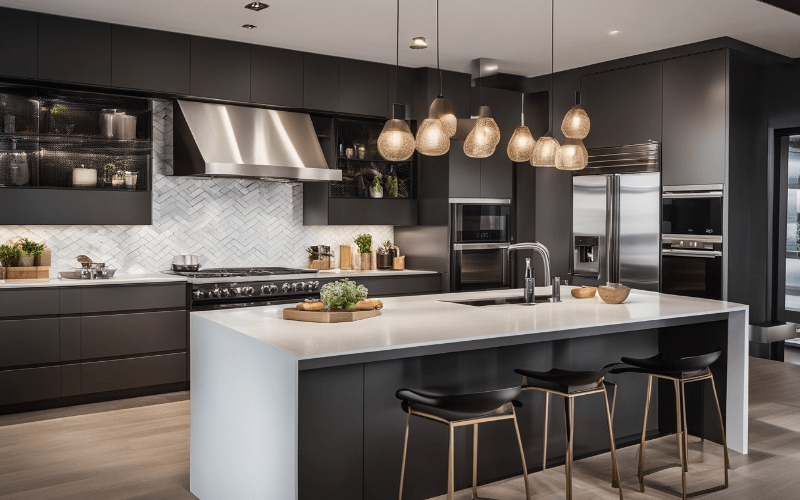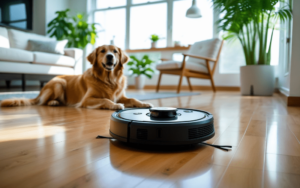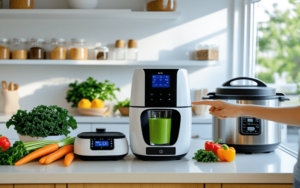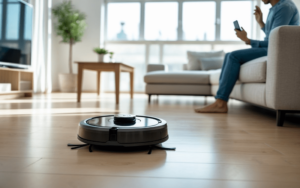The advancement of technology has made it essential for homeowners to consider smart home investments. Incorporating smart devices into a home can significantly increase its market value and appeal to potential buyers.
Please note that this article contains affiliate links. We earn from qualifying purchases at no extra cost to you.

Smart home technology opens up a world of possibilities, from intelligent kitchens to advanced home automation systems.
Energy-efficient systems, such as smart thermostats, not only lower utility bills but also boost the property’s overall value.
Security enhancements, including smart locks and cameras, are increasingly sought after by buyers looking for safety and convenience.
These investments combine technology and comfort to create a more appealing living environment.
We may earn a small commission if you purchase through this link. Thank you for supporting our content!
Furthermore, intelligent kitchens equipped with smart appliances offer a blend of luxury and practicality that modern buyers desire.
Smart home renovations, when carefully selected, provide substantial returns in both current enjoyment and future resale potential.
Key Takeaways
- Smart home devices can boost property value.
- Energy-efficient systems reduce costs and increase appeal.
- Home automation enhances convenience and attractiveness.
The Value of Smart Home Technology
Smart home technology enhances property value by appealing to modern buyer interests and providing substantial long-term return on investment. This value is impacted by current market trends and the efficient usage of energy and resources through smart devices.
Market Trends and Buyer Interests
The real estate market has seen a notable shift towards properties equipped with smart technologies.
Buyers, particularly millennials, are increasingly prioritizing homes with integrated smart systems.
According to a Consumer Reports poll, properties with these features often sell more easily and at higher prices. Features such as smart thermostats, lighting, and security systems are highly sought after.
This growing demand is driven by the perceived benefits of convenience, security, and energy efficiency offered by smart home systems.
Smart security systems can boost property value by up to 5%, while smart thermostats can increase value by 3%, highlighting their financial impact.
These trends demonstrate the value buyers place on technology that simplifies living and enhances home functionality.
Long Term ROI on Smart Home Upgrades
Investing in smart home upgrades offers significant long-term financial returns.
Energy-efficient solutions like smart thermostats and lighting can reduce utility bills, offering ongoing savings that appeal to cost-conscious buyers.
Smart appliances further contribute to lowering energy consumption, maximizing their return on investment.
Here you find some options from Amazon:
A home priced at $500,000 could see an increase in value by $15,000 simply by integrating smart technologies, as shown in recent studies.
These upgrades not only enhance property value but also provide homeowners with peace of mind, knowing their investments yield financial and practical benefits over time.
The added appeal of modern, efficient technology continues to attract a wide pool of potential buyers.
Energy-Efficient Systems
Integrating energy-efficient systems into a home can significantly enhance property value. These systems not only reduce utility costs but also appeal to environmentally conscious buyers.
Two popular energy-efficient upgrades are smart thermostats and intelligent lighting solutions.
Smart Thermostats
Smart thermostats are a pivotal upgrade for homeowners seeking improved energy efficiency.
These devices learn a household’s schedule and adjust the temperature accordingly, ensuring optimal use of heating and cooling systems.
Features like remote control via smartphone apps allow users to manage settings from anywhere.
A key benefit is energy consumption reduction, leading to lower energy bills, which is attractive to potential buyers.
Studies indicate that smart thermostats can provide up to 10-15% savings on heating and cooling costs annually.
Moreover, these thermostats often integrate with other smart home devices, enhancing the home’s overall smart ecosystem.
Intelligent Lighting Solutions
Intelligent lighting solutions represent another impactful energy-efficient upgrade.
These systems offer automation, scheduling, and remote control, allowing homeowners to minimize electricity usage effortlessly.
Many smart lighting systems are compatible with voice-activated assistants, providing added convenience.
Utilizing LEDs in these setups further enhances energy savings, as LEDs consume significantly less power than traditional bulbs.
These lighting systems can be programmed to adjust based on ambient light or time of day, ensuring lights are only used when needed.
As a result, they contribute to lower electricity bills and appeal to tech-savvy buyers.
Security Enhancements

Investing in security enhancements can significantly boost the value of a property.
Key upgrades, such as smart locks and advanced surveillance cameras, ensure safety and attract potential buyers who prioritize security.
Smart Locks and Access Control
Smart locks provide enhanced security and convenience by allowing homeowners to lock and unlock doors remotely via a smartphone app.
These devices often eliminate the need for physical keys, reducing the risk of locks being picked or keys being lost.
Integrating smart locks into a home security system enhances control over property access.
Key features of smart locks include biometric identification and temporary access codes for guests or service workers.
Smart locks with access control can be a pivotal selling point in real estate, as they offer both security and peace of mind.
Many systems log entries and exits, offering detailed access history for increased monitoring capabilities.
Advanced Surveillance Cameras
Advanced surveillance cameras enhance home security by monitoring activity around the property.
Modern systems are equipped with high-definition video recording, night vision, and motion detection features.
These capabilities help in capturing clear images and videos, which could deter potential intruders.
Smart surveillance systems often integrate with other smart home devices, offering real-time alerts to the homeowner via a mobile app.
Such integration enhances the security setup by allowing immediate responses to any detected threats.
Features like cloud storage and two-way communication further augment their usefulness, enabling remote monitoring and interaction.
Intelligent Kitchens

Intelligent kitchens incorporate advanced technology to boost functionality and enhance the overall value of a home.
Integrated smart appliances and internet-enabled kitchen gadgets are among the key features that can transform a kitchen into a modern space, attracting prospective buyers and increasing market appeal.
Smart Appliances
https://amzn.to/42osokwSmart appliances, such as refrigerators and ovens, provide convenience and efficiency.
Many homeowners are investing in fridges that feature touchscreens, cameras, and inventory-tracking capabilities. These features allow users to manage grocery lists, browse recipes, and monitor food freshness.
Smart ovens offer remote control via smartphone apps, enabling users to preheat or adjust cooking settings while away from home.
This flexibility ensures meals are prepared just in time for arrival.
Energy efficiency is a significant selling point for these devices. Smart appliances often use less energy, appealing to eco-conscious buyers who value eco-friendly living.
Internet-Enabled Kitchen Gadgets
Internet-enabled kitchen gadgets include devices like Wi-Fi-connected coffee makers, precision cookers, and scale systems.
These gadgets offer intuitive interfaces, allowing seamless integration with smartphones and voice assistants for effortless operation.
Wi-Fi-connected coffee makers enable users to set brew times, customize coffee strength, and initiate brewing remotely.
This ensures a fresh cup of coffee is ready when needed.
Precision cookers, connected via a smartphone app, maintain precise temperatures for sous-vide cooking. This method ensures consistent and delicious results.
Smart kitchen gadgets provide innovative solutions that are practical and appealing to current homebuyers, reinforcing their role as smart investments.
Home Automation Systems

Home automation systems significantly enhance property value by integrating various smart devices into a centralized platform.
This integration provides homeowners with efficient control and monitoring capabilities, offering convenience, security, and energy savings.
Centralized Control Panels
Centralized control panels are vital in simplifying diverse smart device management.
These panels allow users to manage various home functions like lighting, security, and climate from a single interface.
They can be wall-mounted tablets, handheld devices, or operated through smartphones and tablets.
This technology not only promotes ease of use but also supports customization to fit user preferences.
By reducing the need for multiple apps or controllers, centralized systems facilitate better organization and efficiency.
They often feature user-friendly interfaces that laymen can navigate with ease. Advanced control panels can also integrate with voice-activated assistants, offering further convenience.
Seamless Integration of Devices
A seamless integration of devices within a home automation system ensures that each smart technology operates cohesively.
This capability provides users with a unified experience across different devices, ranging from thermostats to security cameras.
Homeowners benefit from system alerts and can perform synchronized operations, such as setting security alarms and turning off lights simultaneously.
For effective integration, compatibility among devices is crucial.
Many contemporary systems leverage open-source protocols and support broad connectivity options. This ensures diverse gadgets, regardless of brand, can function in harmony, enhancing overall efficiency and user satisfaction.
Frequently Asked Questions
Smart home investments enhance property value by offering buyers modern conveniences and energy efficiency. These improvements can boost a home’s appeal in the competitive real estate market.
What are the top smart home features that can enhance home valuation?
Key smart home features that can increase home value include smart lighting, thermostats, security systems, and appliances.
These technologies offer energy efficiency and convenience, which are attractive to potential buyers.
Features like smart locks and cameras also add perceived security enhancements, making the property more appealing.
How do smart thermostats contribute to a property’s market value?
Smart thermostats improve energy efficiency by automatically adjusting temperatures based on usage patterns.
This not only reduces utility costs but also appeals to environmentally conscious buyers.
The ability to control home climate remotely adds convenience, increasing the property’s overall marketability.
Can the installation of smart security systems significantly improve home resale value?
Yes, smart security systems can provide peace of mind and attract buyers seeking added safety measures.
Features such as smart locks, doorbell cameras, and motion sensors make homes more secure. This can make properties stand out in a competitive market and appeal to families or individuals prioritizing safety.
What impact do smart lighting solutions have on a home’s appeal to potential buyers?
Smart lighting provides flexibility in atmosphere and energy savings. Buyers often appreciate the ability to customize lighting settings remotely and integrate them with other smart home systems.
Automated lighting can reduce energy consumption, adding an eco-friendly aspect to the property’s appeal.
Are smart home appliances considered a good investment for increasing property value?
Smart appliances, like refrigerators and ovens with connectivity features, enhance everyday convenience.
These appliances often operate more efficiently, reducing energy usage and making them attractive to tech-savvy or environmentally conscious buyers. Adding these into a home can contribute to a modern lifestyle appeal.
How does smart home technology affect a home’s energy efficiency and its attractiveness to buyers?
Smart technology integration enhances energy management. It does this by reducing utility bills and carbon footprint. Features like automated climate control and smart lighting optimize power usage. These energy-efficient attributes increase the home’s appeal. This is especially true for buyers seeking cost-effective, sustainable living solutions.
This article contains affiliate links, which means we may earn a commission if you purchase through our links, at no extra cost to you. We earn from qualifying purchases. Thank you for supporting our content!




